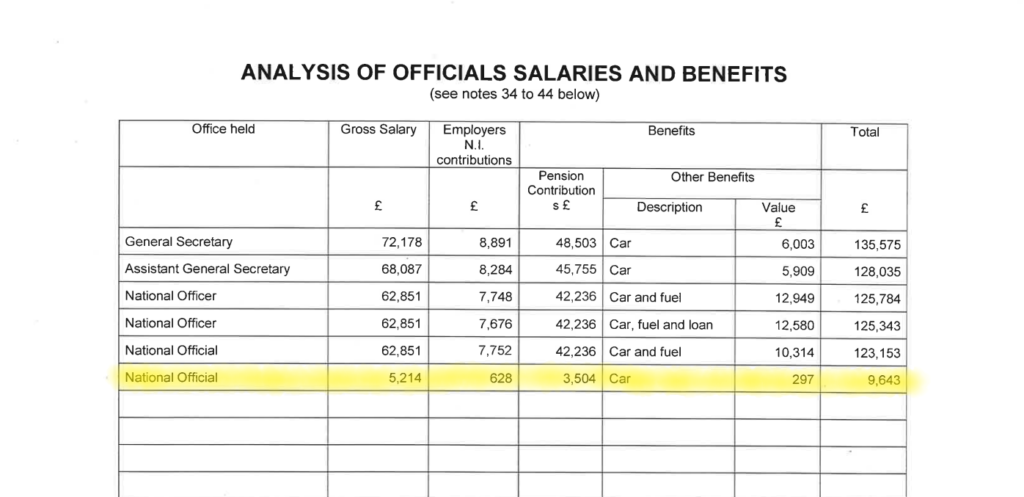THE SCANDAL AROUND secret exit payments at the top of the Fire Brigades Union (FBU) is set to take a very serious turn following the discovery by this blog that the union’s leadership breached its legal duty to declare substantial pay-offs it had made to three departing national officers in financial statements it sent to the official trade union regulator and the union’s own members. What’s more, the failure to disclose the payments appears to have been deliberate.
This new revelation is the gravest yet in the whole sordid ‘hush money’ affair. The actions of whoever within the FBU made the decision to conceal the payments – and thereby falsify the financial statements – amount to a criminal offence that may well land the union in very hot water with authorities. That person, as we will demonstrate below, has also placed himself or herself at risk of imprisonment.
This blog has previously revealed how several of the FBU’s employees left the union with exit payments and non-disclosure agreements (known as ‘gagging clauses’). A number of these individuals had made allegations of mistreatment. In all cases, the full details were withheld from the governing executive council by the union’s most senior officials.
Among the employees to leave in these circumstances were national officers Paul Woolstenholmes, John McGhee and Sean Starbuck. This blog recently discovered that Woolstenholmes received a secret pay-off of over £100,000 and Starbuck a package including a payment and motor car amounting to £50,000. The union’s leadership has refused to disclose how much was paid to McGhee.
Only a handful of officials at the very top of the FBU knew anything about these transactions. In all three cases the payments were subject to non-disclosure agreements, which were designed to insulate them from scrutiny or discussion by anyone else in the union.
But, thanks to the efforts of this blog, that shameful attempt at secrecy has unravelled.
And now comes the revelation that someone at the top of the union appears to have committed a criminal act.
Under trade union law – specifically section 32 of the Trade Union and Labour Relations (Consolidation) Act 1992 – every union in Britain is required to make an annual return detailing its income and expenditure streams to the official trade union regulator (known as the ‘certification officer’). This return must include details of salaries and benefits received by all members of the union’s executive committee (which, for the purposes of the legislation, includes national officers). Regular guidance published by the certification officer makes clear what would already be obvious to anyone with even the most basic knowledge of business accounting: that “benefits” must be taken to include all taxable benefits, and encompasses payouts such as exit payments, ‘golden handshakes’, redundancy, and suchlike.
Unions are also required by section 32A of the Act to circulate the same information in an annual statement to members.
The purpose of the legislation is, of course, to ensure accountability and transparency in the financial affairs of trade unions, and to allow union members to see precisely how their senior representatives are being remunerated and rewarded.
But what do we find when we inspect the FBU’s annual returns to the certification officer and annual statements to members for the years that Woolstenholmes (2015), McGhee (2017) and Starbuck (2021) departed the union?
Well, all three ex-officials feature in the relevant sections of the documents, with their regular salaries and benefits (such as employer’s national insurance and pension contributions, car and fuel) detailed up to the point of their departures. So there can be no doubt that the union’s leaders understood very well that they were legally obligated to include all salary payments and benefits received by these individuals in these financial statements.
Yet we also find that, in all three cases, the substantial exit payments are conspicuously omitted. Neither the annual return to the certification officer nor the annual statement to members contains any trace of these payments. It’s as if they never happened.

It is hard to believe that these omissions were genuine oversights. Once perhaps – but the same innocent oversight on three separate occasions and six years apart? And, as it happens, under two different heads of finance? Members may take some convincing that it was all just an unfortunate coincidence.
Instead, it looks as though someone at the union’s head office made a conscious decision in every case to exclude any reference to the exit payment in the financial statements. Could it be that this person understood that these payments would be seen as controversial by the union’s members and, if disclosed, would trigger a backlash? Or could it be that he or she recognised that the union had entered into private non-disclosure agreements with the three ex-officials, and any disclosure of the exit payments would breach the terms of those agreements and might result in the union being sued by those ex-officials? Did this person therefore choose to prioritise the union’s obligations to maintain secrecy under the non-disclosure agreements above its duty under trade union law to be honest and transparent in its financial statements? If so, what an appalling thing to have done.
So how serious is all this? Well, in a nutshell, it’s about as serious as it gets. Anyone in any doubt about that should examine section 45 of the aforementioned Act. That section sets out what type of actions constitute a criminal offence.
Section 45(1) makes clear that an offence is committed if a trade union refuses or wilfully neglects to perform a duty imposed on it under the Act in relation to its management of financial records (which includes ensuring that the annual return sent to the certification officer and annual statement sent to members are truthful and accurate).
Section 45(4) states that an offence is committed if a person wilfully alters, or causes to be altered, a financial document if his or her intention was to falsify that document so that the union may evade its legal duties under the Act.
Section 45(7) makes clear that an offence is committed if an official or agent of the union falsifies a document relating to the financial affairs of the union or makes a false entry in any such document.
It is hard not to conclude that all three of the above clauses apply in respect of the decision to exclude details of substantial exit payments made to national officers from the financial statements sent to the certification officer and the union’s members.
Meanwhile, section 45A of the Act sets out the potential penalties for the various offences. Under this section, a person who is convicted of falsifying a financial document in the name of a trade union is liable to an unlimited fine and/or imprisonment for a term not exceeding six months.
Where it is not possible to identify under the rules of the union an official responsible for carrying out certain duties which were breached, then, under section 45(2)(b) of the Act, all members of the executive committee will be held liable – something that may give members of the FBU’s executive council a few sleepless nights.
For his part, the general secretary, Matt Wrack, must be called upon to explain why he signed off the financial statements on three separate occasions when he knew that the sections detailing the salaries and benefits of national officers seriously misrepresented what these individuals had actually received.
This blog can confirm that five members of the FBU have submitted a collective complaint to the certification officer about the failure of the leadership to disclose the exit payments in the annual return and statement to members. It is almost certain that the certification officer will launch an investigation into the matter.
It appears inevitable, then, that this whole rotten scandal is set to deepen further. This is no longer just a debate about internal union accountability and transparency; the affair has moved into the area of criminality.
We call upon members and officials to raise these matters urgently within the democratic structures of the FBU. All those who are passionate about the integrity and reputation of our union must unite against the kind of conduct we are witnessing at the top of the organisation.
Our union deserves better.

